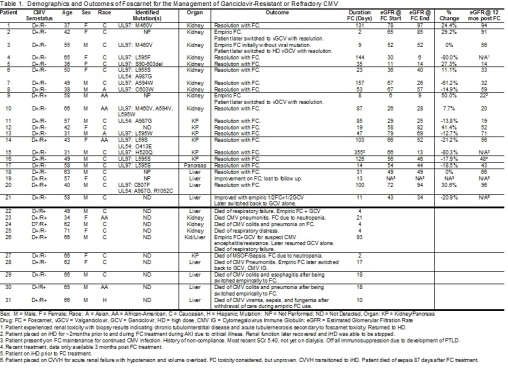Safety and Outcome of Ganciclovir-Resistant CMV Treated With Foscarnet: A Single Center Retrospective Study
B. Pierce,4 C. Richardson,4 K. Cunningham,4 C. D'Agostino,4 C. Tseng,4 J. Brown,4 C. O'Brien,4 B. Ho,1,3,5 M. Ison.1,2,3
1Department of Medicine, Northwestern Medicine, Chicago, IL
2Division of Infectious Diseases, Northwestern Medicine, Chicago, IL
3Division of Organ Transplantation, Northwestern Medicine, Chicago, IL
4Pharmacy, Northwestern Medicine, Chicago, IL
5Transplant Nephrology, Northwestern Medicine, Chicago, IL.
Meeting: 2015 American Transplant Congress
Abstract number: D258
Keywords: Adverse effects, Cytomeglovirus, Outcome, Renal function
Session Information
Session Name: Poster Session D: Viral Infections
Session Type: Poster Session
Date: Tuesday, May 5, 2015
Session Time: 5:30pm-6:30pm
 Presentation Time: 5:30pm-6:30pm
Presentation Time: 5:30pm-6:30pm
Location: Exhibit Hall E
Background: Infection with cytomegalovirus (CMV) is an important cause of morbidity and mortality following solid organ transplantation (SOT). Resistance can rarely develop via mutations in UL97 or UL54. Many agents have been used to treat ganciclovir (GCV)-resistant CMV infections. There is limited published studies assessing the safety and efficacy of foscarnet for the management of GCV-resistant or refractory CMV infection.
Methods: After IRB approval, we retrospectively reviewed the electronic charts of all SOT recipients (R) transplanted between 1/1/06 and 12/31/14 who received at least one dose of foscarnet. Treatment outcomes, tolerability, and safety of foscarnet was evaluated. Most SOTR had genetic resistance testing performed at ViraCor-IBT Laboratories, Lee's Summit, MO. Significant renal dysfunction (SRD) was defined as >25% decline in eGFR during active treatment with foscarnet.
Results: 31 patients received foscarnet (Table 1). 10 (32.3%) SOTR died during treatment with foscarnet; 16/21 (76.2%) surviving SOTRs had documented resistance, and all 21 surviving SOTRs cleared infection. 3 (14.3%) patients developed SRD; 2/3 had renal biopsy results consistent with foscarnet-induced toxicity.
Conclusions: GCV-resistant CMV infection is associated with high mortality (32.3%). Of those SOTRs treated with foscarnet and survived, SRD was rare, even with extended use. Use of multi-disciplinary teams, including PharmDs, expert nursing staff and TID physicians likely contributes to the excellent outcomes.

To cite this abstract in AMA style:
Pierce B, Richardson C, Cunningham K, D'Agostino C, Tseng C, Brown J, O'Brien C, Ho B, Ison M. Safety and Outcome of Ganciclovir-Resistant CMV Treated With Foscarnet: A Single Center Retrospective Study [abstract]. Am J Transplant. 2015; 15 (suppl 3). https://atcmeetingabstracts.com/abstract/safety-and-outcome-of-ganciclovir-resistant-cmv-treated-with-foscarnet-a-single-center-retrospective-study/. Accessed February 16, 2026.« Back to 2015 American Transplant Congress
